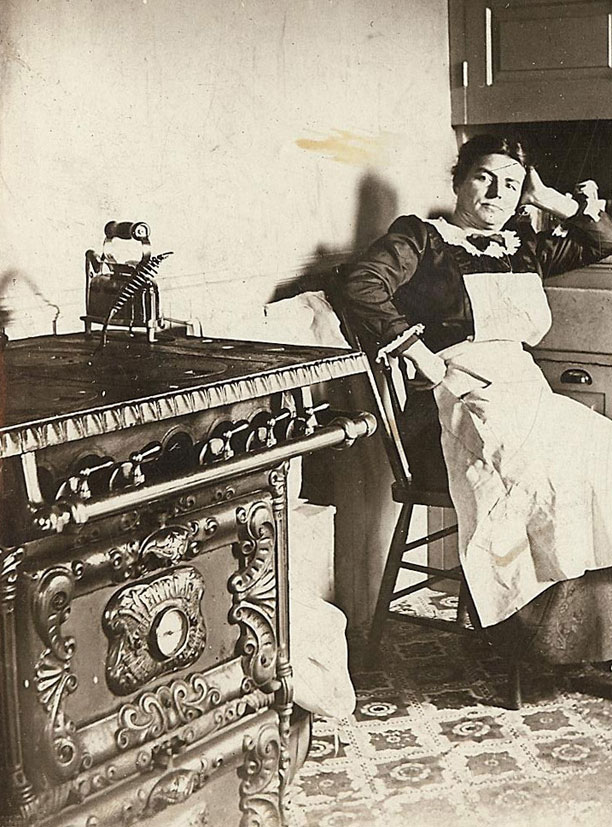Paris Downstairs: The upper servants
From "Victorian Paris" (https://victorianparis.wordpress.com/2014/03/01/paris-downstairs-the-upper-servants/)
This excerpt from Octave Uzanne’s The Modern Parisienne was written in 1912, but it captures the attitude towards servants and women in general of the period that we are studying.
The lady’s maid, who must not be confounded with the soubrette previously noticed, is very often of the same native place as the mistress, sometimes her foster-sister. She is generally from sixteen to thirty-five years old. She dresses her mistress, does her mending, irons small articles, rummages in the drawers on pretext of tidying, reads forgotten letters, annexes any knickknacks lying about, takes advantage of any passing generosity of her mistress in order to get possession of hats and dresses more or less worse for wear.
is generally from sixteen to thirty-five years old. She dresses her mistress, does her mending, irons small articles, rummages in the drawers on pretext of tidying, reads forgotten letters, annexes any knickknacks lying about, takes advantage of any passing generosity of her mistress in order to get possession of hats and dresses more or less worse for wear.
She is usually plain and prudish, goes to Mass on Sundays, attends her Easter duties, and below stairs gives herself airs of superiority over the other servants. In domestic quarrels she takes Madame’s part against Monsieur, not from any affection, but partly through a sense of esprit de corps, and partly that in a sense she regards Monsieur from Madame’s point of view, i.e. as a husband. An entirely platonic feeling, let us hasten to say, as she carefully keeps aloof from Monsieur’s endearments, more out of prudence than from principle. She desires to keep her place. Her wage amounts to from forty to seventy francs a month. When she returns to her province at thirty-five, she is able to bestow on some obscure clerk her somewhat faded charms, and her equivocal savings; these she can invest in a small business in groceries, fruit, drapery or dressmaking, and so the world is richer for another bourgeoise.
The cook is a middle-aged woman of from thirty-five to forty-five years of age, sometimes married either to the coachman or the chauffeur, if her employers’ means permit them to keep horses or motor-cars; or perhaps to some clerk or policeman who lives elsewhere, and whom she visits on one day in the week, generally on Sunday. She is a tall, stout, imposing person, with a face like a full moon, and very proud of her culinary skill. She is extremely clean, and she will not allow any interference from her mistress. “I won’t have any meddling in my sauces,” she says. A spoilt dish reduces her to despair; she revenges herself on her scapegoat – the poor scullery maid.
She has no hesitation in keeping back some tidbits for her husband. Anything that is left over she sells. She accepts her commission from the tradespeople, and is very indignant if her mistress presumes to assist at the marketings. Frequently she has been known, in such circumstances, to give notice in a burst of righteous indignation.
She is very sentimental, reads assiduously the novelettes in the Petit Journal, and is passionately interested in accounts of kidnapped children or adultery in fashionable quarters. She hums sentimental songs while she trusses a fowl or stirs a sauce. She is a regular Mrs. Malaprop, and mangles hopelessly all the terms in her menus. She is quite absorbed by a desire to make money, and keeps at a distance all the men who may be attracted by her formidable personality. Her wages amount to from fifty to eighty francs per month. The dream of her life is to retire with her husband to the provinces, and keep a small inn.
The children’s nurse is generally German or English. This post is the highest in the profession. The nurse is held in a certain respect, as she is treated somewhat like a governess. Even if she only comes from the provinces, she receives a certain amount of deference; she lives mostly with her employers, and therefore knows how to behave, though this does not prevent her from using the most startling language when the children are not there. She is often pretty, and her ambition is to struggle for precedence with the lady’s maid. If her mistress allows her to wear a hat she is in the seventh heaven of bliss.
She is bored by the children, and often tries to terrorise them, telling them tales of giants and ghosts. It is amusing to see her, in the public gardens, displaying the greatest affection for her little charges, joining in their games, that is, if Madame is present, but cross, haughty, and ready with slaps if she is alone with the “little brats”. Her favourite occupation is to make eyes at the passers-by. As she is generally pretty, she is made much of in the house. She has charming manners, and boasts to the other servants of the fancy Monsieur has for her. She reads quantities of novels, and the most extraordinary adventures appear to her quite reasonable. She dreams of being loved for herself alone, and of eloping, as in the romantic tales at sixty centimes. Perhaps she left some fair Wilhelm in her native country, to whom she writes ardent letters.
The children’s nurses provide a large contingent for the reserve belonging to the great army of Parisian sirens, and many of them are found in the beer-houses (*) of the Latin Quarter. Consumed by a love of luxury and proud of their looks, they can earn as wages of an average thirty-five to fifty francs, which is spent immediately in finery. Nursemaids are an exception to the rest of their class, they are extravagant and hardly save anything.